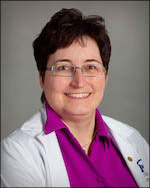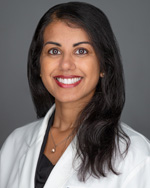Program Bridges Age Gap in Cancer Treatment
It’s no surprise 78-year-old Patricia Cline’s first thought when she was diagnosed with stage 4 breast cancer was better me than someone younger.
“Because I am older, I have a different perspective,” said Cline, a retired educator. “However long I survive is fine with me.”
But why shouldn’t Cline be afforded the same opportunities when it comes to treatment and survival as someone in their 20s or 40s?
Moffitt Cancer Center’s Senior Adult Oncology Program, where Cline is now a patient, is working to bridge that gap, and Cline has already seen results. “Every time I talk to an oncologist here, they tell me they know how to deal with this cancer and I could easily get 10 more years.”

Dr. Martine Extermann, program leader, Senior Adult Oncology at Moffitt Cancer Center.
In fact, a 75-year-old woman in the United States has on average 15 years to live, and an 80-year-old in this country has a 40% chance of living to 90. “My elderly patients are surprised to hear that if they have cancer or metastatic cancer, it’s not an automatic tomorrow death penalty,” said Dr. Martine Extermann, chair of Moffitt’s Senior Adult Oncology Program. The program is specifically designed to meet the unique needs of patients over age 70.
Extermann started her career in geriatric oncology in the early 1990s, a time where many oncologists thought most cancer treatments were too toxic for older people. With half of cancers occurring beyond the age of 70, she knew it was time to focus on finding treatments for the aging population.
“We did a lot of research to demonstrate that we see real people in their 70s,” said Extermann. “Yes, they have cancer, but they also have other diseases. We all age differently and we have to find the proper treatment for each person. We have to weigh more carefully the pros and cons of the treatment and assess carefully a patient’s biological age and chronological age.”
Fast forward to today where Moffitt is a world leader in geriatric oncology. It was the first center in the U.S. to establish a senior adult oncology program, and international scholars travel to Tampa to learn the field in the hopes of developing a program in their home country.
“There are a number of challenges in treating older patients with cancer,” said Dr. Christine Sam, a medical oncologist in the Senior Adult Oncology Program. “The paradox is that although the majority of cancer patients are over 65, many of the landmark trials we base our guidelines on did not have senior patients on them. Even if they did, they usually are the fittest patients and do not represent some of the frail patients we see on a day-to-day basis.”

Dr. Christine Sam, oncologist, Senior Adult Oncology.
Moffitt researchers are trying to combat this problem with Total Cancer Care, a databank that tracks and studies tumor samples to help change the way doctors prevent, detect and treat cancer.
“A lot of older patients won’t fit into the profile of a clinical trial because they may have cancer plus diabetes or cancer plus heart disease, and there are no trials for those kinds of patients,” said Extermann. “We are trying to build from the data in Total Cancer Care patient profiles so we can find similar patterns in patients and help oncologists treat elderly patients better.”
Sam says the future of geriatric oncology will also rely on developing better ways to perform geriatric assessments. “These evaluations are critical for forming accurate assessments of a patient’s physical condition, and also predict for toxicities and problems that could occur on treatment,” she said. Completing these assessments can be long and difficult, so Moffitt is always working on developing more efficient tools to help complete them.
The more advancements the field makes, the more patients like Cline will benefit. She is doing well in her treatment and is planning to take one of her grandchildren to Europe this fall.
This year, Moffitt was recognized as an Age-Friendly Health System Committed to Care Excellence by the Institute for Healthcare Improvement. It was the first hospital in Florida to receive the honor, which is given to health care institutions that are guided by an essential set of age-friendly, evidence-based practices.



